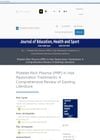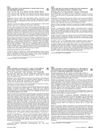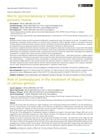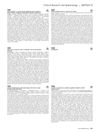1 citations,
August 2016 in “Pan Stanford Publishing Pte. Ltd. eBooks” Low-level light therapy can help with hair growth and preventing hair loss.
[object Object] 1 citations,
March 2015 in “Hair transplant forum international” Generic finasteride works just as well as the brand-name version for hair loss.
 March 2020 in “Faculty Opinions – Post-Publication Peer Review of the Biomedical Literature”
March 2020 in “Faculty Opinions – Post-Publication Peer Review of the Biomedical Literature” Combining nonablative fractional laser with minoxidil was effective for alopecia areata with only one patient relapsing after a year.
 September 2024 in “Journal of Education Health and Sport”
September 2024 in “Journal of Education Health and Sport” PRP therapy can help regrow hair and improve hair thickness.
July 2024 in “International Journal of Molecular Sciences” RF-based therapies might help treat hair loss.
June 2024 in “Regenerative Therapy” iPSCs show promise for hair regeneration but need more research to improve reliability and effectiveness.

Herbal remedies might help with hair loss but need more research for safety and effectiveness.
 December 2023 in “International Journal of Biomedicine”
December 2023 in “International Journal of Biomedicine” Topical finasteride might help with male hair loss with fewer side effects than pills, but more research is needed.
 October 2023 in “Frontiers in medicine”
October 2023 in “Frontiers in medicine” Targeted immunotherapy could be a promising new treatment for hair regrowth.
 June 2022 in “Frontiers in Medicine”
June 2022 in “Frontiers in Medicine” Acupuncture and moxibustion may help treat hair loss, but more research is needed.
 August 2018 in “Journal of The American Academy of Dermatology”
August 2018 in “Journal of The American Academy of Dermatology” Ozenoxacin 1% cream is an effective and safe treatment for impetigo in children and adults.
 September 2024 in “Journal of the American Academy of Dermatology”
September 2024 in “Journal of the American Academy of Dermatology” Semaglutide does not significantly increase the risk of hair loss.
 September 2021 in “Медицинский совет”
September 2021 in “Медицинский совет” Proteoglycans, especially in Nourkrin®, can effectively and safely treat hair loss.
 June 2020 in “Journal of Investigative Dermatology”
June 2020 in “Journal of Investigative Dermatology” Red clover extract-based scalp treatments significantly improved hair volume and reduced hair loss and damage.

Coconut oil and turmeric were almost as good as 2% ketoconazole shampoo for treating dandruff.
JAK inhibitors show promise in treating moderate to severe alopecia areata.
January 2019 in “Figshare” Intralesional corticosteroids are best for mild alopecia areata, and DPCP is best for severe cases.
September 2017 in “Hair transplant forum international” Biotin is popular for hair loss, but there's little scientific proof it works.
April 2012 in “韓國藥用作物學會誌 = Korean journal of medicinal crop science” Rosa multiflora root extract promotes hair growth and prevents hair loss.
[object Object]  March 2007 in “Faculty Opinions – Post-Publication Peer Review of the Biomedical Literature”
March 2007 in “Faculty Opinions – Post-Publication Peer Review of the Biomedical Literature” Dutasteride helps reduce male pattern hair loss, but may cause side effects like altered libido and erectile dysfunction.
January 2023 in “International Journal of Trichology” Alcohol-free minoxidil is better for treating hair loss in Indian men.
 June 1996 in “Archives of Dermatology”
June 1996 in “Archives of Dermatology” Minoxidil, tretinoin, and finasteride may help hair regrowth in mild to moderate androgenetic alopecia.
 April 2018 in “Expert Opinion on Drug Safety”
April 2018 in “Expert Opinion on Drug Safety” Dutasteride is a safe and effective treatment for hair loss.
 7 citations,
April 2012 in “Clinical investigation”
7 citations,
April 2012 in “Clinical investigation” Transdermal testosterone can improve sexual desire in postmenopausal women but lacks long-term safety data and is not FDA-approved for this use.
 September 2019 in “Journal of Investigative Dermatology”
September 2019 in “Journal of Investigative Dermatology” Retinol significantly reduces neck wrinkles.
 September 2019 in “Journal of Investigative Dermatology”
September 2019 in “Journal of Investigative Dermatology” Sandalore®, a synthetic scent, reduced hair loss and improved hair growth in women with telogen effluvium.
June 2022 in “Journal of Cosmetic Dermatology” Minimally invasive procedures may help with female hair loss but need more research and should be done by experts.
 30 citations,
December 1999 in “International Journal of Dermatology”
30 citations,
December 1999 in “International Journal of Dermatology” Oral ivermectin effectively cured scabies with minimal side effects, and finasteride promoted hair growth in men with hair loss.
 26 citations,
March 2007 in “Clinical and experimental dermatology”
26 citations,
March 2007 in “Clinical and experimental dermatology” Pimecrolimus cream is not effective for treating alopecia areata.
 18 citations,
March 2017 in “International clinical psychopharmacology”
18 citations,
March 2017 in “International clinical psychopharmacology” Inositol was not more effective than a placebo in treating trichotillomania.



















